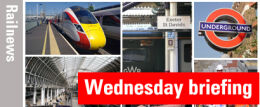Posted 9th October 2024 | 3 Comments
Wednesday briefing: Lobby group claims private rail operators are better value

Better value claim
The lobby group Rail Partners is claiming that private rail operators are better value for taxpayers. In its latest newsletter, RP highlights payments to the Treasury from operators worth £3.8 billion between 2010 and 2019, although this figure does not take into account the direct grants made to Network Rail, which reduced track access charges paid by operators. Rail Partners is calling for the passenger railway to be operated through concessions, which is the model used by Transport for London, rather than nationalised outright. Meanwhile, the Passenger Railway Services (Public Ownership) Bill has reached committee stage in the House of Lords, after receiving its second reading two days ago.
Belfast central station opening
Belfast’s new central station is to open on Sunday. Translink has confirmed that the the first train to depart from Belfast Grand Central will be an Enterprise service to Dublin at 08.05, and the first train to arrive will be the 08.30 from Portadown, due in at 09.15. Translink has described Grand Central as ‘the largest integrated travel hub on the island of Ireland’, with eight platforms and 26 bus stands. The station has been designed to cater for up to 20 million journeys a year.
Leaf fall timetables
Train operators are warning that the times of some trains will be changed slightly, as leaf fall timetables come into force. Southeastern said some of its services will depart a few minutes earlier from Sunday, and that it has been estimated that 50 million leaves fall on to the railway in the south east of England alone each autumn.
Reader Comments:
Views expressed in submitted comments are that of the author, and not necessarily shared by Railnews.

david C smith, Bletchley
As far as "public or private sector " is concerned, it does appear to me that there is no clear criterion in this country as to what activities should be in each of these two categories. On the one hand , organisations such as our water boards are presently in the private sector , although there can't be any competition to give proper accountability ,At the same time , indiscriminate nationalisation in the railway seems to be the future, although the conditions for private sector operation are good regarding accountability through competition for some railway operations.
My impression is that there has been a mistaken reliance on " regulators" to look after the consumer , in many of the privatised industries, which as natural monopolies cannot be subject to competition, whilst those enterprises that have potential to thrive and be accountable via competition are not given the opportunity.
I just wish and hope a bit of a rethink might occur in Government, particularly re. GB railways, not based on ideology.
Chris Jones-Bridger, Buckley Flintshire
You correctly call out Rail Partners for being 'selective with the actuality'. The franchises were always shells. Unless directly earned, revenue was always subject to interpretation of inter business allocation rules & as you note NR infrastructure grant allocation was either charged or excluded. The challenge of accurately allocating revenue and cost between businesses has been a costly abstract economic exercise overseen by ORR which after 30 years of privatisation never produced the perfect solution. Unfortunately though the continual churn of franchise ownership increasingly became a distraction from running the day job.
david C smith, Bletchley
The history of railway reorganisations has given us the "big four"( 1923), Nationalisation( 1948) and Franchising Privatisation ( mid 1990's until now ). It appears all these had problems arising, and to just go back to one of these models would be unwise.
During the BR era , possibly the greatest positive move was the inception of Sectorisation, with each Sector largely concentrating on their own management decisions. I would like to suggest that something like this, encompassing both public and private sectors might just give what is needed.
Specifically, those sectors , such as suburban / commuter operations, and general infrastructure, which are captive market natural monopolies need to be publically owned and managed , perhaps on a City region basis, with a directly elected "supremo". Sectors ( eg Intercity / long distance services and Railfreight ) may perform better acting as competing private businesses. There is then the whole business of subsidisation, which might take up too much space to fully address here, but if applied could make these TOC's and FOCs sufficiently attractive for able / gifted managers .